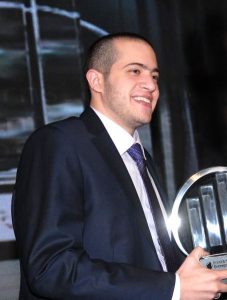
One senior Arab space official is once said to have quipped that his country does not need a meteorological satellite since he knows what the weather will be next year, never mind tomorrow.
Jokes aside, the Middle East has a more varied climate than many suppose, and has weather variations even in places where it might seem there are none. The ability to measure and, to the greatest extent possible, predict heat, humidity, winds (and therefore sand storms), and precipitation has profound implications for the economy and a functioning modern society.
ArabiaWeather, a company founded and headquartered in Amman, Jordan, and with offices in Dubai, United Arab Emirates, and Riyadh, Saudi Arabia, is growing rapidly as more and more regional clients sign up for its weather forecasting services.
Founded in 2010 by a young entrepreneur named Mohammed al-Shaker, ArabiaWeather has over 200 small weather terminals distributed around the Middle East, uses licensed weather satellite imagery provided by the European Organisation for the Exploitation of Meteorological Satellites (EUMETSAT). The data is fed into leased supercomputers located in Finland and Slovenia who crunch the numbers and produce hourly weather data for over 5,000 locations throughout the Middle East and North Africa.
Yet Mr. Al-Shaker has had to overcome a serious challenge to his growing business – a challenge posed by his own government in Jordan. The Jordanian government’s own weather service, and therefore the chief competitor of ArabiaWeather in Jordan, is proposing legislation to license private weather companies, and impose imprisonment and fines for those who do not have licenses. This is despite the willingness of ArabiaWeather to cooperate with national weather services across the Middle East.
This example of government overreach is an example of the often contradictory forces at work in the Middle East, and elsewhere around the world. On the one hand, governments seek to harness the so-called ‘start-up’ business culture to solve their economic problems, especially youth unemployment. ArabiaWeather is a great example of a start-up business and mentality (Mr. Al-Shaker is only 26 years old) that is meeting a genuine need for specific weather predictions throughout the region.
On the other hand, these start-up companies are stifled – and often do not survive – because of excessive, and even vindictive government regulation that preserves mediocre and sclerotic government services and agencies. The tragedy is that this approach not only strangles promising businesses and entrepreneurs, it also perpetuates an economic status quo that is increasingly unsustainable. Middle East governments can do better by rationalising legislation and policies that are contradictory in order to give start-up companies and young entrepreneurs a better chance for success.
Further, in this era of low oil prices and therefore diminishing government largesse, companies like ArabiaWeather are a prime example of how a public-private approach to services such as weather forecasting can work. This approach, done correctly, can help keep government budgets in trim, raise the performance of the public sector as it has to compete, and provide jobs for young people.
SpaceWatch Middle East unashamedly advocates and supports Middle East start-ups in space and other high-technology sectors, and implores governments throughout the region to create the conditions for these companies to flourish.
Original published at: http://spacewatchme.com/2016/07/arabiaweather-jordanian-company-talking-weather/
 SpaceWatch.Global An independent perspective on space
SpaceWatch.Global An independent perspective on space

